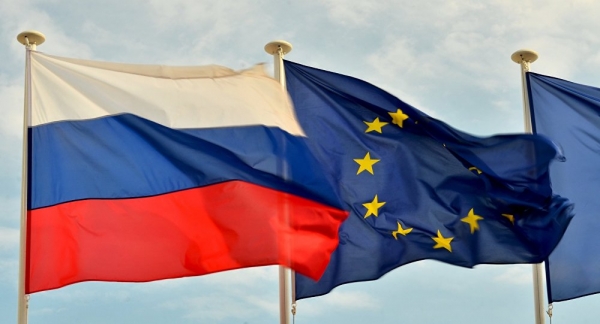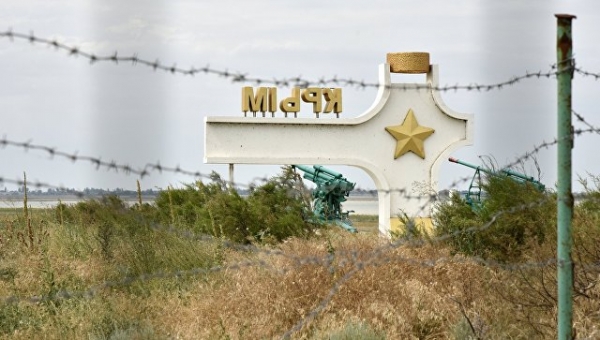Unexpected actions of the Kremlin has created a new strategic reality, worsen the situation of provocateurs, but this does not mean that provocations will be organized.

High representative of the European Union for foreign Affairs and security policy Frederica Mogherini announced five principles, which will be built the relationship of the EU with Russia in the near future. The principles agreed by the foreign Ministers of the EU countries during the meeting held on 14 March in Brussels.
Formally in the position of the EU, almost nothing has changed. In fact, Brussels was dramatically elevated the degree of diplomatic confrontation with Moscow.
Given the fact that the number of opponents of the sanctions policy within the EU is not just growing, but is close to reaching critical mass, the decision more than strange. Moreover, on the eve of Italy and Hungary officially stated that they oppose automatic renewal of sanctions against Russia this summer. Meanwhile, announced five principles, if the EU is to follow them literally, make this extension inevitable. And even allow to put the issue of tougher sanctions. We will understand in order.
Firstly, repeated the thesis about the necessity of full implementation of the Minsk agreements to relations of Bruxelles with Moscow could undergo significant changes. Since Moscow is not a party to the Minsk agreements, just as the EU was able to link normalization with substantial progress in inter-Korean dialogue.
But the EU is not just retained its position as the linkage between domestic problems of the Russian-European relations. Voicing this item, Mogherini was careful to say that the EU will not change its stance of non-recognition of the annexation of Crimea to Russia. In the course of a year, elapsed since the conclusion of the Minsk agreements, the EU painstakingly endured the Crimean issue out of the brackets the discussion. Unofficially, its representatives at the talks promised that the Crimean question for Brussels is closed forever. And suddenly opened.
Secondly, the EU gathered to strengthen the “Eastern partnership”. And if previously, it by default only applied to the European Republic of the former USSR and the Caucasus, now indicated that it will develop, starting with Central Asia.
Note that in the last two years, EU leaders have repeatedly stated that the policy of “Eastern partnership” has not justified itself and should be minimized. Now we are talking about the expansion of the expansion of the EU in the former Soviet Union and the “Eastern partnership” extends to the borders of China, Pakistan and Afghanistan. On only Korea and Japan.
In-the third, the x-EC met again to work on securing the internal stability in the field of energy security and strategic communications. This means that the EU will try to limit the presence of Gazprom on the European market of hydrocarbons. And stability in strategic communications means limiting Russia’s ability to expand (or even maintain) its presence in the European information environment.
Fourthly, any cooperation with Russia should be selective and focused only on the interests of the EU. The interests of Moscow it is supposed to ignore. This is the same model of relations, based on which Ukraine was imposed unequal Association agreement, and at the same time a coup with the direct participation of the EU. It is clear that with Russia so to speak useless.
Fifthly, the EU was going to expand its work with Russian civil society, especially with young people. Actually it is about the direct support of Pro-Western opposition, which the next day after the Brussels decision was announced in Vilnius that he was going to come to power in Russia with the help of externally supported coup.
Why and what for?
Why would it crumble from internal problems and not independent in the foreign policy of the European Union, in recent months very helpful in relation to Russia, suddenly so brave?
To properly answer this question it is necessary to assess the overall development of the international situation in the last month.
The first thing you should notice is the aggressive Union of Turkey and Saudi Arabia. Both countries see a way out of its domestic and international problems in the aggression against Syria. With the beginning of the peace process under the auspices of Russia and the United States the danger of direct aggression is reduced, but not disappeared completely.
Against this background, Turkey has won Europe a discussion on the refugees, and now the EU not only pays Ankara tens of billions on their content, but entirely dependent on the goodwill of the Erdogan how much, any refugee, when and how you will get from Turkey into its territory. In this situation, when any international conflict with the participation of the EU will think twice whether to anger Erdogan’s “unconstructive position”.
Second. The Kiev regime sharply intensified tensions in the Donbass, began to build up forces on the border with the Crimea and does not hide his intentions to provoke an armed conflict with Russia. Limitation only one. In the conflict must be drawn a sufficient number of countries to Kiev was able to avoid the danger of instant destruction.
In parallel with military activity in the South and the East of Ukraine Poroshenko went to Erdogan. Anti-Russian context of the outbreak of the Ukrainian-Turkish friendship is not hidden. Begun to visit the organizations activity of Crimean Tatar emigrants in the Kherson region after the visit has increased. About organization of the Crimean Tatar autonomy in the Kherson region on the border with Crimea is officially talking. The Crimea, Poroshenko has once again promised to return to Ukraine.
It should be understood that plunged the country into a state of catastrophe incompetent Kiev regime needs war, as air — to distract the population from domestic problems and consolidation of Nazi militants around the authorities under the slogan “struggle against the aggressor”.
Once again, Kiev is fighting not only because he is afraid of instant destruction. If the Ukrainian government decides that Russian forces will be stretched on several fronts, and diplomatic support the EU provided to them, they will start a war necessarily.
Third. Kiev has taken the initiative to appoint leaders of DNR/LNR “compromise figure” Akhmetov and smartly. The format of the Minsk agreements says nothing about the appointment of a “compromise figures” instead of power, freely chosen in the republics. Moreover, neither Kiev nor Moscow (especially from Paris to Berlin) there is no real possibility to ensure such “purpose”, in full, by the way, destroying Minsk.
But as an act that demonstrates to the stakeholders in Brussels on “good will” of the Kiev authorities and “destructive position” of Moscow, this provocative proposal is very fit. If after it will be discarded, fighting in the Donbass finally go beyond the local collision, it will be possible to say that “it is Russia’s fault”.
Thus, on the borders of Russia are tied two knots of tension:
1. Kherson region — the Crimea, where Kiev is configured to act in Alliance with Turkey and its controlled terrorists who call themselves “Crimean Tatars”;
2. The Donbas, where the Ukrainian army is gradually building the intensity of the clashes to a full-scale war. But does it gradually, so that, in the case of hard response, DNR/LNR and Russia could always be accused of inadequate response to unprovoked aggression.
At the same time militaristic psychosis continues in the Baltic States. It elite a few weeks in a row on every street corner talk about preparing them against “Russian aggression”. Under attack eventually put the entire Western border of the Russian Federation. Provocation can happen anywhere, running a chain of subsequent provocations. Then from the Baltic to Ankara all at the same time complains of a “comprehensive aggression” of Russia.
In these circumstances it is not surprising that part of military aviation, formed the group HQs of the Russian Federation in Syria, was urgently withdrawn to airfields near Voronezh and the North Caucasus. This is the most dangerous from the point of view of a comprehensive attempt provocations in the region. And grouping can quickly lead to a sense of Ukraine (even without crossing the border), to isolate it from Turkey and force the latter to think about offensive operations in the middle East, and about the defense of their black sea coast.
All of these events occurred in the period plus or minus a few days since the announcement of the five-point EU.
Obviously, Pro-Brussels and the European bureaucracy are under threat of losing power, “Atlantic” elite of France and Germany, with the support of Russophobic regimes in Eastern Europe and not without the help of the irrepressible American hawks, have decided on a “last and decisive” battle, which mobilized all available forces of.
Russia responded, demonstrating a willingness to respond blow for blow. Judging by the speed of reaction, provocation should occur soon after the adoption of the “five points of the EU”. Unexpected actions of the Kremlin has created a new strategic reality, worsen the situation of provocateurs, but this does not mean that provocations will be organized. The engine is running, and some participants (Poroshenko, Erdogan) retreat to nowhere in particular.
Probably, Washington and Brussels are still able to jointly give the command “stop!” and even achieve its overall execution. But is it possible to return this coherent team, timely communication to Ottoman militarists, Ukrainian Nazis and the Baltic border States, as well as tight control of performance in conditions of confusion and disorder in the European and American elites? It is difficult to say.








